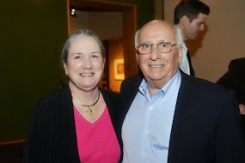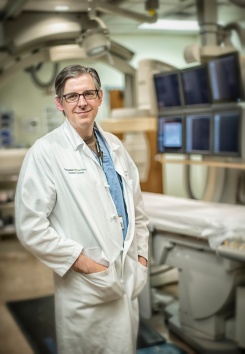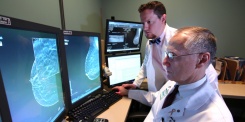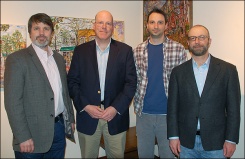Celebration for Tom Dina, Radiology Residency Program Director
Ed Donnelly and Hai Nguyen
April 4, 2014
On March 8, 2014, past and current residents of the Vanderbilt Radiology Residency Program gathered to honor their mentor on the eve of his retirement after 19 years as program director. Dr. Thomas S. Dina joined the faculty at Vanderbilt in 1994 and became program director in 1995; his impending retirement caps a 40-year career in neuroradiology. Over the span of his career at Vanderbilt, Dr. Dina has trained 165 residents and 32 fellows in neuroradiology.
Interventional Oncology at Vanderbilt University
Jennifer Ford
April 3, 2014
At the 2014 Symposium on Clinical Interventional Oncology (CIO), Dr. Dan Brown, presented information about therapies for neuroendocrine tumors. Interventional Oncology 360 interviewed Dr. Brown about the interventional oncology therapies provided at Vanderbilt University as well as his CIO presentation.
Q: How did you become involved in the interventional oncology specialty?
3-D Emaging Enhances Options for Breast Cancer Screening
Dagny Stuart
March 27, 2014
The Vanderbilt Breast Center at Vanderbilt Health One Hundred Oaks has added tomosynthesis mammography, an imaging technique that creates a three-dimensional image of breast tissue, to help screen patients for breast cancer.
While a standard mammogram machine takes a static picture from above the breast, the tomosynthesis tube moves over the breast in an arc.
Biomedical Engineering Institute Honors four VUIIS Research faculty
Bill Snyder
March 13, 2014
Four Vanderbilt University faculty members have been elected to the College of Fellows of the American Institute for Medical and Biological Engineering (AIMBE).
Among 120 “outstanding leaders, engineers, entrepreneurs and innovators in medical and biological engineering” nominated by their peers and elected to the class of 2014, they are:
Neuroangio Suite Bolsters Stroke Treatment Efforts
Leslie Hill
March 13, 2014
A new advanced stroke treatment suite debuts this month at Vanderbilt University Medical Center, offering better care for patients with blood circulation problems in the head and neck, such as stroke and aneurysm.
The neuroangiography suite occupies operating rooms 1 and 8, and comprises two bi-plane imaging machines, including the new Siemens Artis Q, which offers improved image quality with lower doses of radiation.




